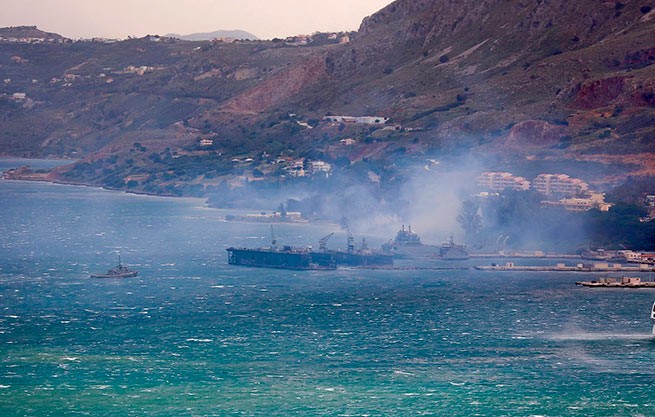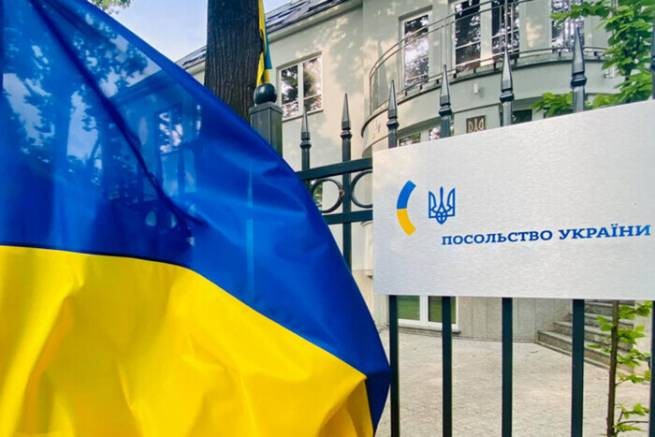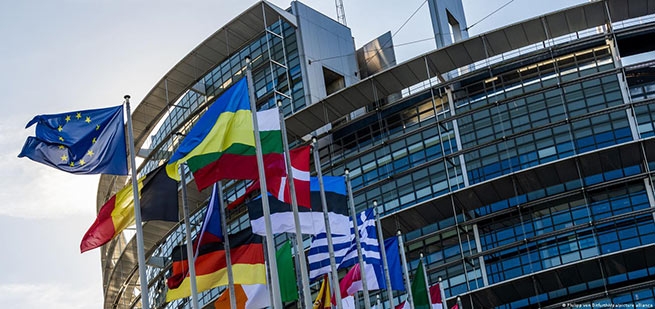On Wednesday, November 23, the European Parliament will vote on a resolution containing a provision on recognizing Russia as a state sponsor of terrorism due to Russia’s military aggression against Ukraine.
The information note prepared for MEPs and staff of the European Parliament explains that this resolution is a response to the call of the President of Ukraine Volodymyr Zelensky to recognize the Russian Federation as a state sponsor of terrorism, voiced by him for the first time in April 2022.
Andrius Kubilius, a MEP from Lithuania, from the country that initiated the resolution, said on Facebook that on the eve of the start of the session week, negotiations between the political groups of the European Parliament to agree on a draft of this resolution lasted several hours. Kubilius wrote that not all groups were unanimous on the wording of the document, but still “much has been achieved.”
“The final text of the resolution is still being edited, but its main provision is as follows: “The European Parliament (…) recognizes Russia as a state supporting (sponsoring) terrorism and a state using terrorist methods of activity,” the Lithuanian MEP specified.
The US has a different position
To date, the parliaments of Latvia, Lithuania, Poland, Estonia, as well as the lower house of the highest legislative body of the Czech Republic, have already passed resolutions recognizing Russia as a state supporting terrorism, condemning the large-scale attacks by the Russian army on Ukraine’s critical energy infrastructure. A similar appeal in the United States to President Joe Biden was also made by some members of Congress. But White House officials argue that applying the term “state sponsor of terrorism” to Russia would do more harm than good. US presidential spokeswoman Karine Jean-Pierre said the move could have “unintended consequences for Ukraine and the world.” In addition, the White House fears that such a decision could undermine the ability of the United States to provide Ukraine with diplomatic assistance.
Resolution without consequences?
If on November 23 the resolution recognizing the Russian Federation as a state sponsor of terrorism is supported by the majority of European deputies, this will mean that for the first time the European Union will have to decide what exactly it understands by the phrase “state sponsor of terrorism”, and what legal consequences await the country in respect of which this term is applied. Taking into account the fact that the United States is not yet ready to approve the idea of including Russia on the list of states supporting terrorism, avoiding the possible consequences of such a step, analysts express doubts: are the MEPs in a hurry, responding to Kyiv’s calls?
In relation to whom and for what reasons can a decision be made to recognize the state as a sponsor of terrorism? In the United States, for example, there is a special document that lists countries that have “repeatedly supported acts of international terrorism.” Currently, there are only four states on this list: Cuba, Iran, North Korea and Syria. They are subject to restrictions on the provision of foreign aid, a ban on the sale of weapons, controls on the export of dual-use technologies, and various financial sanctions. Canada also has legislation on states that support terrorism.
As for the European Union, then, according to the European Commissioner for Home Affairs Ylva Johansson, at the moment in EU there is no legal basis for recognizing a third country as a state sponsor of terrorism. Thus, even if the majority of MEPs support the relevant resolution, it will not have legal consequences. Moreover, the European Parliament has limited influence on EU foreign policy issues.
Don’t get confused by terms
There are also some semantic nuances in this discussion. According to Lisa Musiol, an EU analyst at the non-governmental organization Crisis Group, it seems that in the text of the resolution of the European Parliament, definitions “state-sponsor of terrorism” and “state-terrorist” (as Ukraine insists) are used interchangeably, even though it’s not really the same thing.. Thus, according to US law, state sponsors of terrorism are those that support international terrorism. For example, Washington accuses Iran of supporting proxy and partner groups in Bahrain, Iraq, Lebanon, Syria and Yemen, including Hezbollah and Hamas.” Republican Senator Lindsey Graham claimed that Putin “participated in state-sponsored assassinations,” the Wagner group “, supported by Russiaterrorizes the world, and the war crimes committed daily in Ukraine shock the conscience.”
At the same time, there is no generally accepted definition of the term “terrorist state,” Lisa Musiol points out. According to her, he implies that the country uses violence against its citizens or other states, but “the use of this term is highly politicized.” The expert believes that, regardless of which definition of the two is used in the text of the EP resolution, none of them have any legal implications in the EU.
“You need to find the right words to face reality”
“The main purpose of this resolution is to reflect the current situation: Russia is using the methods of terrorists and financing them,” Vsevolod Chentsov, Permanent Representative of Ukraine to the EU, said during a briefing in Brussels on Monday. In his words, the resolution should be “a political and moral statement that will change the perception of the Russian government and establish it as a criminal regime that uses the worst methods.” At the same time, Chentsov expects that the EU will want to create “legal instruments for identifying terrorist countries.” “We do not accept arguments that such practice or legislation does not exist. We need to find the right words to recognize the reality and create an appropriate basis for this,” the Ukrainian diplomat explained.
The representative of the European Conservatives and Reformists (ECR) group, which supported the proposal to prepare a resolution, is convinced that the adoption of this document by the European Parliament will send a strong signal: “The symbolic significance of such a resolution cannot be underestimated.”
For their part, analysts from the Crisis Group, sharing the fears of the Biden administration, do not support the use of measures by Brussels against Russia, similar to those taken by the United States against states recognized by Washington as sponsors of terrorism. Lisa Musiol believes that it makes sense for the EU to focus on initiatives that have real consequences. Such as new sanctions against the Russian Federation, the supply of weapons and economic assistance to Kyiv, military training of units of the Armed Forces of Ukraine. As for symbolic gestures, in her opinion, granting Ukraine the status of an EU candidate was a much more significant step.
Based on the publication dw







More Stories
Argentina buys 24 F-16s from Denmark, another 19 Danish F-16AM/BM will be transferred to Ukraine
MEPs suspected of having ties with the Russian Federation may lose their immunity
Terrorist attack in Israel with car ramming